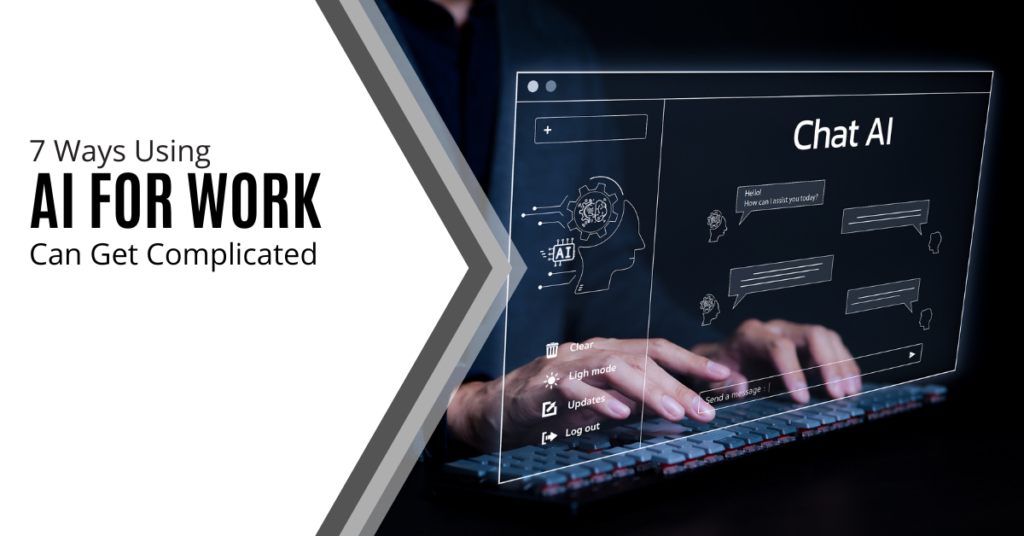|
Getting your Trinity Audio player ready...
|

AI in the workplace is changing how businesses operate. While artificial intelligence (AI) can increase productivity and automate tasks, it also introduces challenges that companies must be prepared to manage. In this article, we will discuss the advantages and disadvantages of using AI in the workplace and how businesses can adapt to these changes effectively.
What is AI and How Does It Affect the Workplace?
AI, or Artificial Intelligence, is the simulation of human intelligence by computer systems. Its capabilities include writing, data analysis, and even art creation. AI’s ability to simplify complex processes and automate repetitive tasks is driving significant changes across various industries.
The use of AI in the workplace has numerous benefits, such as improving productivity and enhancing performance. However, AI is not without its flaws — incorrect outputs, bias, and technical failures can create significant problems if not carefully managed.
Major Challenges of AI in the Workplace
1. Incorrect Information
AI relies on data to generate solutions to problems. If the data used is inaccurate or outdated, the AI will produce incorrect results. This can lead to poor decision-making and disruptions in business operations.
2. Strange or Nonsensical Outputs
AI can sometimes generate unusual or meaningless outputs. For example, it may produce poorly written content or distorted images when processing data. These mistakes can confuse employees, waste time, and reduce overall productivity.
Can AI in the Workplace Lead to Bias?
Yes, AI in the workplace can reflect human bias. AI systems are trained using data collected from human sources. If the data contains bias, the AI will reproduce that bias in its decisions. This could result in unfair hiring practices, unequal treatment of customers, and poor business decisions.
For example, if an AI system is trained using biased recruitment data, it may favor certain groups over others when screening candidates. This can lead to discrimination and legal issues for the company.
How AI Impacts Employment
1. Job Loss
AI in the workplace raises concerns about job displacement. Automation allows AI to perform repetitive tasks more quickly and efficiently than humans, which could reduce the demand for certain jobs and lead to layoffs in affected industries.
2. Need for New Skills
Although some jobs may be lost due to AI automation, new opportunities will emerge. Businesses will need employees skilled in AI management, data analysis, and strategic planning. Upskilling and retraining will be essential for workers to adapt to the evolving job market.
Can We Always Rely on AI in the Workplace?
No, AI is not always reliable. Technical failures, incorrect data inputs, and unforeseen issues can cause AI systems to malfunction. Businesses that rely solely on AI without backup plans risk operational failures if the system goes down or produces incorrect results.
To prevent this, companies should maintain human oversight and regularly review AI-generated outputs for accuracy and reliability.
How AI Affects Teamwork and Collaboration
AI in the workplace can change how teams work together. When AI automates certain tasks, employees may have fewer opportunities to collaborate. This could weaken teamwork and reduce creativity and problem-solving ability within the organization.
To maintain strong team dynamics, businesses should ensure that AI supports collaboration rather than replacing it entirely.
Privacy Concerns with AI in the Workplace
AI systems rely on large data sets to function effectively, raising significant privacy concerns. Employees may worry about AI tracking their work habits or accessing personal information.
To address these concerns, companies should implement clear data protection policies and be transparent about how AI systems use employee data. Ensuring that AI adheres to privacy regulations will help build trust and protect employee rights.
Legal and Ethical Issues
AI in the workplace presents complex legal and ethical challenges. If AI generates content or makes decisions, it can be difficult to determine who holds responsibility — the developer, the company, or the AI system itself.
Additionally, intellectual property rights for AI-generated content are still a legal gray area. Businesses need to consult with legal experts to clarify ownership and liability issues related to AI.
How to Use AI in the Workplace Safely
To maximize the benefits of AI while managing the risks, businesses should:
- Monitor AI-generated results regularly to ensure accuracy and reliability.
- Maintain human oversight for all critical decisions.
- Provide employee training on AI systems to improve adoption and performance.
- Develop clear policies for AI use and data protection.
- Stay informed about AI regulations and industry best practices.
Starting the Process of Implementing AI in the Workplace
AI in the workplace offers significant advantages, but businesses must be prepared to handle the challenges that come with it. By adopting thoughtful strategies and maintaining human control, companies can harness AI’s potential while minimizing risks.
If you’re considering adopting AI in the workplace, contact us today for expert guidance and tailored solutions.
Twintel has grown into an expansive, full team of IT services professionals, acting as the outsourced IT department of non-profits, small to mid-size businesses, and enterprise-level corporations in Orange County, across California, and nationally.
Today, it’s the strength and deep expertise of the Twintel team that drives positive outcomes for clients. Each of the support staff, technicians, and engineers works diligently each day to make sure that the companies served have the seamless, secure, and stable IT environments needed to allow them to pursue their organizational objectives.